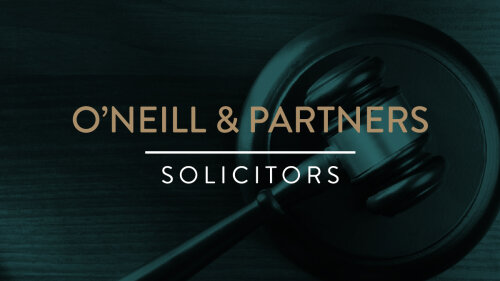Best Appeal Lawyers in Limerick
Share your needs with us, get contacted by law firms.
Free. Takes 2 min.
List of the best lawyers in Limerick, Ireland
About Appeal Law in Limerick, Ireland
Appeal law in Limerick, as elsewhere in Ireland, governs the process of challenging or seeking a review of decisions made by courts or tribunals. If an individual or party is not satisfied with the outcome of a case, they may have the right to appeal to a higher court or body. Appeals can relate to both civil and criminal matters and provide a critical mechanism for ensuring justice, correcting errors, and interpreting provisions of the law. In Limerick, appeals can be made from District Court to Circuit Court, from Circuit Court to the High Court, and so on, depending on the nature and gravity of the case.
Why You May Need a Lawyer
Legal professionals play a vital role in the appeals process. Appeal proceedings are complex, involving strict timelines, detailed legal arguments, and procedural rules. You may need a lawyer in circumstances such as:
- If you believe a lower court’s decision was incorrect or unfair
- When new evidence has come to light after a trial
- If there was a significant legal or procedural error in your case
- When you require representation during an appeal hearing
- To prepare persuasive written arguments (known as submissions)
- If you have queries about eligibility for appealing a decision
- To advise you on the likelihood of success and potential outcomes
- To ensure compliance with time limits and necessary paperwork
- If you are responding to an appeal initiated by another party
Local Laws Overview
Limerick, as part of the Irish legal system, follows national legislation and court rules governing appeals. Key aspects include:
- Right to Appeal: Most cases allow for at least one level of appeal, but this right may be subject to conditions, such as filing notices within a set period following the original decision.
- Types of Appeals: Appeals can be based on errors of law, errors of fact, or both. Some appeals are “de novo” (a full rehearing), while others are restricted to legal issues.
- Court Structure: District Court decisions are generally appealed to the Circuit Court, Circuit Court cases to the High Court, and so on, with some criminal appeals going to the Court of Appeal or Supreme Court.
- Procedure: Appeals require strict adherence to procedural steps such as filing written notices, serving documents on other parties, and presenting arguments either in writing or verbally during hearings.
- Time Limits: There are strict time frames for initiating appeals, typically ranging from 14 to 28 days, depending on the court and type of case.
- Cost: There may be fees associated with filing an appeal, and legal representation is often advisable to navigate complexities.
Frequently Asked Questions
What types of cases can be appealed in Limerick?
Most civil and criminal decisions from local courts can be appealed, including family law, personal injury, property disputes, and criminal convictions.
How much time do I have to file an appeal?
Time limits vary, but they can be as short as 14 days after the original decision, so it is crucial to seek advice promptly.
How do I start an appeal?
Typically, you must file a notice of appeal outlining the grounds for your appeal with the relevant court office and serve it on the other parties involved.
What happens during an appeal hearing?
The appeal court reviews written and oral arguments, examines the record of the lower court’s proceedings, and may hear additional evidence, depending on the type of appeal.
Can I present new evidence on appeal?
Generally, appeals focus on issues raised in the original proceedings, but in some cases, especially in de novo appeals, new evidence may be allowed.
If I lose my appeal, can I appeal again?
Further appeals are possible but usually require leave (permission) from the higher court and depend on the issues at stake.
What are the possible outcomes of an appeal?
The court can uphold (affirm) the original decision, overturn it, modify it, or send the case back for a new hearing.
Will my sentence or order be enforced while I appeal?
In some cases, enforcement is paused (stayed) pending appeal, but you may need to specifically apply for a stay of execution.
Do I need a lawyer to appeal?
While it is not obligatory to have a lawyer, legal representation is highly recommended due to the complexity and stakes involved in appeals.
How much does an appeal cost?
Costs vary depending on the complexity of the case, court fees, and whether you hire a lawyer. You may also be liable for the other side’s costs if unsuccessful, so seek advice on potential expenses.
Additional Resources
Those seeking assistance with appeals in Limerick may find the following organizations and resources helpful:
- Citizens Information Centre Limerick – offers guidance on legal rights and the appeals process
- The Law Society of Ireland – directory of solicitors with expertise in appeals
- Courts Service of Ireland – provides information and procedural guidance for appeals
- Legal Aid Board – can help with legal representation for those on limited means
- Limerick Bar Association – connects with local barristers experienced in appellate work
Next Steps
If you believe you may need to appeal a decision or are defending against an appeal in Limerick, start by gathering all relevant documentation, including the original decision and any court transcripts. Seek prompt legal advice to understand your rights, time limits, and the likelihood of success. Consider consulting with a local solicitor who has a background in appellate law. They can guide you through the process, help you prepare the required documentation, and represent your interests in court. Take action as soon as possible, since time is of the essence in appeal matters. If cost is a concern, inquire about legal aid or pro bono assistance available within the area.
Lawzana helps you find the best lawyers and law firms in Limerick through a curated and pre-screened list of qualified legal professionals. Our platform offers rankings and detailed profiles of attorneys and law firms, allowing you to compare based on practice areas, including Appeal, experience, and client feedback.
Each profile includes a description of the firm's areas of practice, client reviews, team members and partners, year of establishment, spoken languages, office locations, contact information, social media presence, and any published articles or resources. Most firms on our platform speak English and are experienced in both local and international legal matters.
Get a quote from top-rated law firms in Limerick, Ireland — quickly, securely, and without unnecessary hassle.
Disclaimer:
The information provided on this page is for general informational purposes only and does not constitute legal advice. While we strive to ensure the accuracy and relevance of the content, legal information may change over time, and interpretations of the law can vary. You should always consult with a qualified legal professional for advice specific to your situation.
We disclaim all liability for actions taken or not taken based on the content of this page. If you believe any information is incorrect or outdated, please contact us, and we will review and update it where appropriate.














